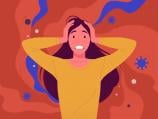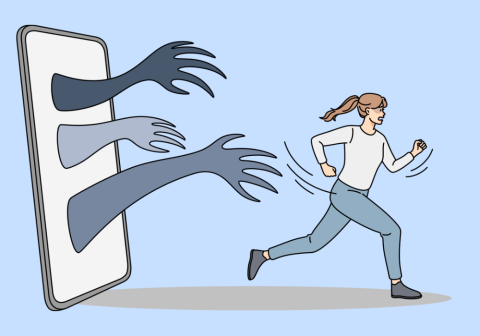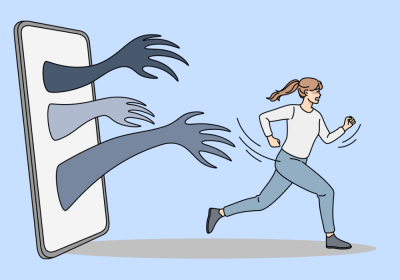My Panic Attack
 You are sitting on a chair listening to a conversation between two people. One of them is your mentor—a psychologist with a specialty in clinical psychology—and the other is a voluntary participant in a clinical research study.
You are sitting on a chair listening to a conversation between two people. One of them is your mentor—a psychologist with a specialty in clinical psychology—and the other is a voluntary participant in a clinical research study.
The place is an office space on the 22nd floor of a hospital building. It is 11 am on a rather warm and sunny October day. Your chair is leaning against the wall, and your large black tea is sitting conveniently to your right on a small rectangular table that seems to serve no other purpose than that for which you are using it. To your left is a small bare window that offers you a view of the blue sky and distant tall buildings. The room is bland, unattractive, and poorly lit. You are listening intently to the conversation between these two people when suddenly you feel discomfort.
The feeling of discomfort grows exponentially in a matter of seconds; your pulse is pounding, your heart is racing, your body is shaking, and your temperature is rising. You must do something. Your breathing becomes shallow, you feel faint, and you are sweating profusely. Now you really must do something, because you fear that you might be gasping for air very soon, and so you start looking around for ways to exit. You are now mentally tracing the various ways that will get you out of the building fast; perhaps the stairway is the best option because you will certainly not use the elevators and risk being stuck in one. Then, you remember that window! At that moment, you experience instant relief as your feeling of discomfort is waning slowly, because you know that if you need air you can just open the window. Your pulse is no longer racing, nor is your heart, and your breathing is starting to follow a normal rhythm. Now that you are no longer focused on escaping away, you realize that you have just had a panic attack.
A panic attack does not last very long; most episodes last a few seconds, but the intensity is such that after the body goes back to normal, the person feels as if they were depleted of all their energy. Legs are wobbly and can no longer sustain the weight of the body, the body is shaking, and the mind remains clouded and confused. Reeling from a panic attack takes longer than the episode itself. It is for those reasons that you will go to great lengths to avoid anything that could trigger another episode. The symptoms of a panic attack are the same for everyone, but the actual experience of it is really what determines how a person is going to react going forward.
After an episode of panic, the brain forms an association between its occurrence and the whereabouts of the sufferer. This process leads to an automatic avoidance response of the site where the panic attack occurred; be it a store, a particular street, or even a room in one’s home. Once formed, the mental association consolidates the avoidance behavior; which means that being at the site where the panic attack occurred, or even thinking about it in some extreme cases, could trigger another panic attack. Subsequently, the very act of avoiding the place where one had a panic attack further solidifies the mental association, thereby creating a vicious loop.
The experience of anxiety in comparison is less intense than a panic attack, but it is chronic. It can be compared to a feeling of discomfort that will not go away. When in the prongs of an anxiety attack, it is almost impossible to reach a state of relaxation because your body is flooded with hormones that keep your body and mind on high alert. It is important to make a clear distinction between an anxiety disorder and normal anxiety. The latter is a normal, intermittent emotion brought on by a specific situation, while an anxiety disorder is chronic, disproportionate to the situation, and interferes with the person’s normal life, hence it is referred to as a disorder.
Living with anxiety can be a difficult feat because it can put a strain on one’s life. At the height of my anxiety attack, I had to make quite a few changes, including spending less time out with my friends, putting aside my studies, and taking fewer responsibilities at work. Conversely, I also made a few positive changes such as practicing meditation on a regular basis, eating healthy meals, exercising, etc… which were the driving force behind my recovery.
The secret to my success in overcoming my anxiety includes perseverance and systematic efforts. Once I implemented these changes, I stuck to them and followed them diligently. I found a lot of resources online, tips and guidance from websites dedicated to anxiety disorders like this one, and today I can say I am free of panic attacks and my anxiety is no longer a problem in my life.
About the author:
Hi, I am Yasmina. About 10 years ago, I suffered from generalized anxiety disorder with panic attacks which left me confused, scared and somewhat hopeless. Thankfully, I was able to conquer that depressed mood and fought back my anxiety. I found many resources online that helped me create my recovery path, and after 3 years of diligent work on myself, I was back to my normal, albeit much improved, self. Now, it is my turn to give back and provide support, resources and information about anxiety to help others get back on their feet and overcome their anxiety.
- Share Your Story and Voice and Help #breakthestigma Around Mental Health
- Support ADAA's Mission - Every Gift Makes an Impact
- Join an ADAA Online Peer to Peer Support Community
- Find Your Therapist



















